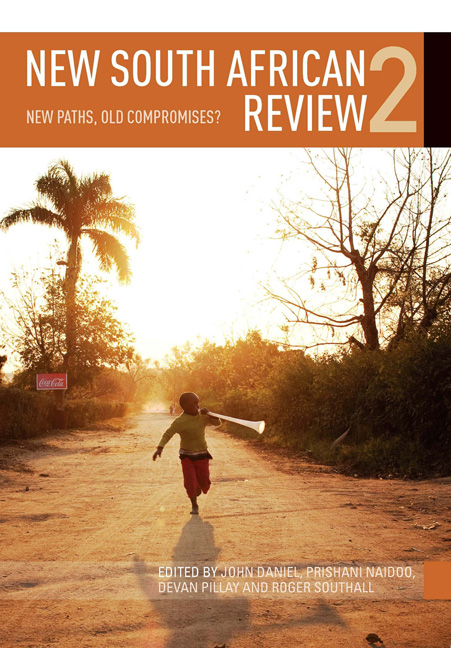Book contents
- Frontmatter
- Contents
- Preface
- Introduction: New paths, old (com)promises?
- PART 1 POLITICS AND INTERNATIONAL
- Introduction: The Zuma presidency: The politics of paralysis?
- Chapter 1 The Tripartite Alliance and its discontents: Contesting the ‘National Democratic Revolution’ in the Zuma era
- Chapter 2 The African National Congress and the Zanufication debate
- Chapter 3 Dancing like a monkey: The Democratic Alliance and opposition politics in South Africa
- Chapter 4 Democracy and accountability: Quo Vadis South Africa?
- Chapter 5 Civil society and participatory policy making in South Africa: Gaps and opportunities
- Chapter 6 Bring back Kaiser Matanzima? Communal land, traditional leaders and the politics of nostalgia
- Chapter 7 South Africa and ‘Southern Africa’: What relationship in 2011?
- PART 2 ECONOMY AND SOCIETY
- PART 3 ENVIRONMENT
- PART 4 MEDIA
- Contributors
- Index
Chapter 5 - Civil society and participatory policy making in South Africa: Gaps and opportunities
from PART 1 - POLITICS AND INTERNATIONAL
Published online by Cambridge University Press: 23 March 2018
- Frontmatter
- Contents
- Preface
- Introduction: New paths, old (com)promises?
- PART 1 POLITICS AND INTERNATIONAL
- Introduction: The Zuma presidency: The politics of paralysis?
- Chapter 1 The Tripartite Alliance and its discontents: Contesting the ‘National Democratic Revolution’ in the Zuma era
- Chapter 2 The African National Congress and the Zanufication debate
- Chapter 3 Dancing like a monkey: The Democratic Alliance and opposition politics in South Africa
- Chapter 4 Democracy and accountability: Quo Vadis South Africa?
- Chapter 5 Civil society and participatory policy making in South Africa: Gaps and opportunities
- Chapter 6 Bring back Kaiser Matanzima? Communal land, traditional leaders and the politics of nostalgia
- Chapter 7 South Africa and ‘Southern Africa’: What relationship in 2011?
- PART 2 ECONOMY AND SOCIETY
- PART 3 ENVIRONMENT
- PART 4 MEDIA
- Contributors
- Index
Summary
The National Assembly must facilitate public involvement in the legislative and other processes of the Assembly and its Committees (section 59 (1) of the 1996 Constitution).
The National Council of Provinces may: make rules and orders concerning its business, with due regard to representative and participatory democracy, accountability, transparency and public involvement (section 70b).
A provincial legislature or any of its committees may: receive petitions, representations or submissions from any interested person and institutions (section 115a).
The focus of this chapter is public participation in policy making in South Africa, exploring how participation and deliberation can overcome the shortcomings of a purely representative democracy by connecting citizen voice with state decision making, thereby transforming broader social power relations and enabling responsive policy making. The chapter provides an overview of policy and legislative provisions for participation, existing mechanisms and practice and, through highlighting civil society experiences of these processes, it presents a case for the need to open up executive policy-making processes to engagement by affected communities.
THEORETICAL FRAMEWORK FOR PARTICIPATION
Participatory policy making and the democratic ‘deficit’
Many authors have written about the notion of a ‘democracy deficit’ – the failure of established, liberal notions of representative or participatory democracy to link citizens with the institutions and processes of the state, affecting the quality and vibrancy of democracy and resulting in reduced accountability (Gaventa, 2004; Luckham et al., 2000). Many democracies are characterised by a sense of disappointment as to how little elections improve government accountability and performance.
Carothers (2005) notes that political participation declines where poverty, inequality and corruption increase and where citizens become increasingly sceptical and distrustful of political parties and institutions. This widening gap between citizens and state institutions results in what Skocpol (2003: 11) has called a ‘diminished democracy’. Where political parties focus on electoral processes to the detriment of effective representation, links between citizens and the state are eroded. The result, in most cases, is a weakened democracy with poor representation (Carothers, 2005).
- Type
- Chapter
- Information
- New South African Review 2New paths, old compromises?, pp. 100 - 118Publisher: Wits University PressPrint publication year: 2012



